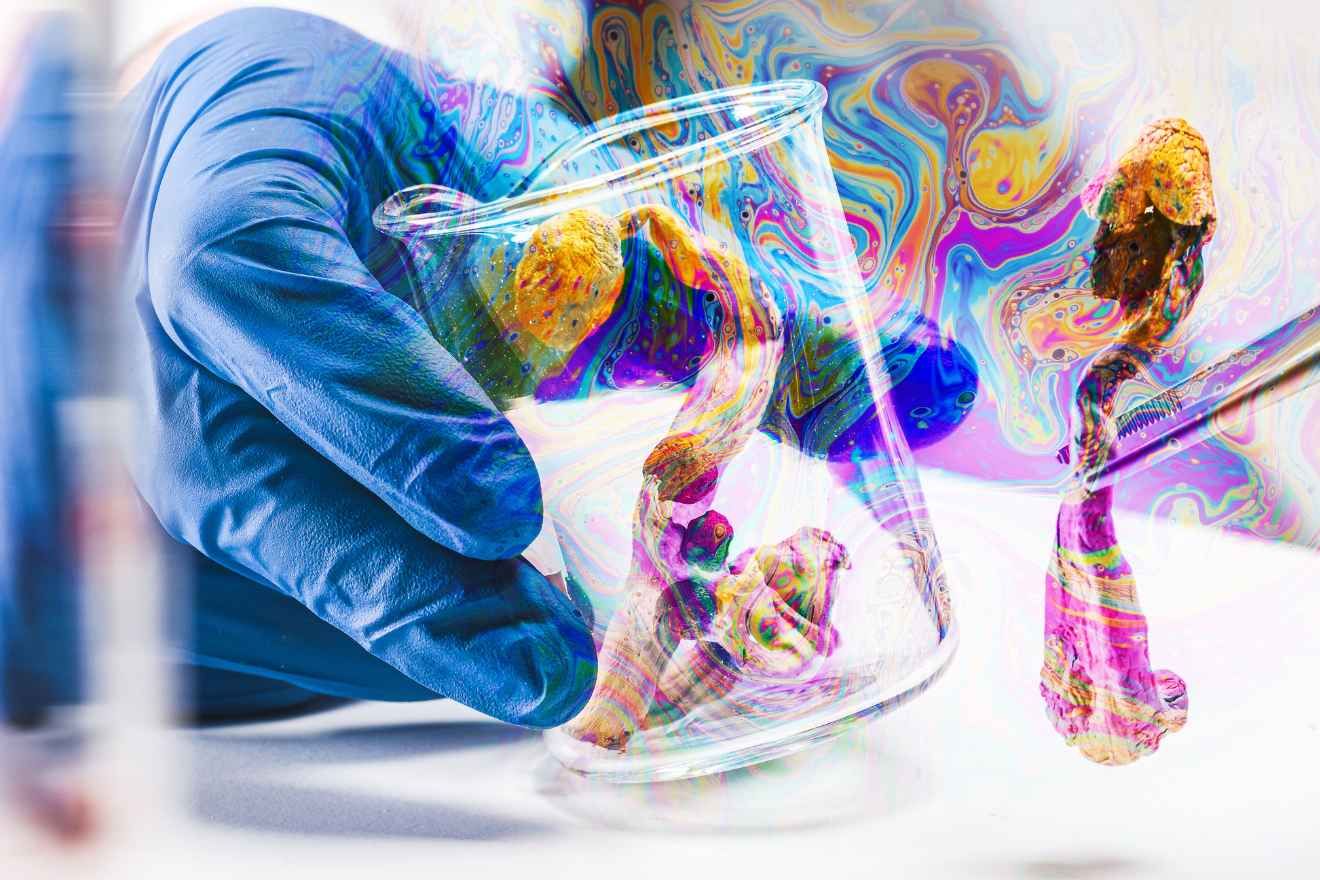On June 23, 2023, the FDA released the first draft guidance document to inform psychedelic clinical trials and drug development. It included details on study design and fundamental considerations in researching psychedelic treatment potential for substance use and psychiatric disorders. The guidance document has been long anticipated after the FDA Division of Psychiatry first spoke publicly in 2019 about how to design and efficiently study psychedelics for potential medical use (read a summary of the FDA presentation on psychedelic drug development).
Read on to learn more about the draft guideline, its purpose, terms, and what it includes.
Purpose
In the FDA news release, it states that the purpose of the draft guidance is “to advise researchers on study design and other considerations as they develop medications that contain psychedelics.”
Tiffany Farchione, M.D., the director of the Division of Psychiatry in the FDA’s Center for Drug Evaluation and Research, provided commentary in the news release.
Dr. Farchione shared that although current psychedelic research has shown promising results in potentially treating mood, anxiety, and substance use disorders, psychedelics “are still investigational products. Sponsors evaluating the therapeutic potential of these drugs should consider their unique characteristics when designing clinical studies.”
Dr. Farchione explained, “By publishing this draft guidance, the FDA hopes to outline the challenges inherent in designing psychedelic drug development programs and provide information on how to address these challenges. The goal is to help researchers design studies that will yield interpretable results that will be capable of supporting future drug applications.”
Learn more about FDA and NIH Perspectives on Psychedelic Drug Development.
Clarification of the Psychedelic Term
The draft guidance document clarifies that the term psychedelics refers to those that are known as classic psychedelics.
Specifically, it describes that it includes 5-HT2 agonists that act on the brain’s serotonin system such as lysergic acid diethylamide (LSD) and psilocybin, and serotonin-releasing agents including empathogens or entactogens such as methylenedioxymethamphetamine (MDMA).
Legality
Upon downloading the document, the site states that the draft guidance is not for implementation, contains non-binding recommendations and is being distributed for comment purposes only.
The draft guidance clarifies that it does not establish legally enforceable responsibilities. Unless statutory or regulatory requirements are stated, the guidance serves to reflect the FDA�’s current perspective on a topic.
In the introduction section of the draft document, it clarifies that the word ‘should’ does not mean that guidance is required. Instead, it refers to something that is suggested or recommended.
Application
In regards to what types of psychedelic clinical trials the draft guidance applies to, here’s what it states:
“This guidance applies to clinical trials that will be conducted under an investigational new drug application (IND), including such clinical trials (e.g., research or academic studies) that are not intended to support marketing applications. The principles in this guidance are intended to support the ethical conduct of clinical trials as well as to ensure the integrity of the trial and the reliability of the results.”
Fundamental Considerations
The draft guidance describes fundamental considerations throughout the drug development process including trial conduct, data collection, subject safety, and new drug application requirements.
The FDA news release explained how psychedelic drug trials differ from other drug trials:
“The evidentiary standard for establishing effectiveness of psychedelic drugs is the same as for all other drugs. However, there are unique factors investigators may need to consider when designing their clinical trials if those trials are to be considered adequate and well-controlled.”
Here are some of the highlighted considerations included in the draft guidance.
Drug Safety Measures
Psychedelic drugs act on the central nervous system and can cause psychoactive effects such as hallucinations, altered mood and cognition changes.
The FDA explained that drug safety measures need to be considered for psychedelic clinical trials due to the potential for their abuse. Sufficient safety measures need to be carefully and effectively implemented to reduce the risk of misuse throughout clinical development.
On page 7 of the draft guidance, it provided clarification on when a human abuse potential study should be conducted.
“A human abuse potential study should generally be conducted when a drug has shown abuse-related signals in animal and/or human studies. However, a human abuse potential study may not be scientifically necessary for certain psychedelic drugs to support the abuse potential assessment in a new drug application when the subjective effects predictive of abuse are well characterized from extensive clinical studies and robust epidemiological data exist to demonstrate that individuals are using the psychedelic drug for abuse purposes.”
Adverse Event Reporting
An adverse event in the context of IND safety reporting refers to “any untoward medical occurrence associated with the use of a drug in humans, whether or not considered drug-related”.
The draft guidance described when, how, and types of adverse events that should be reported in reference to psychedelic studies.
During a clinical study, psychedelic responses should be evaluated by monitoring abuse-related adverse events such as euphoria, hallucinations, stimulation, and emotional lability. These should be reported as a safety concern and monitored “even if they are hypothesized to be associated with the therapeutic response”.
Therefore, investigators and session monitors should be trained to track abuse-related adverse events, including psychedelic ones.
Psychedelic Drugs Under Schedule I Controlled Substances
The draft guidance emphasized that in clinical trials conducted under an IND, psychedelics listed as a Schedule I controlled substance must comply with the applicable Drug Enforcement Administration (DEA) regulatory requirements including research, manufacturing, importation/exportation, handling, and storage.
The investigator who intends to conduct research using these substances must have a Schedule I registration issued by the DEA before beginning a nonclinical or clinical study.
Learn more about how to access psychedelic therapy legally in and outside of the United States.
Clinical Pharmacology
The draft guidance provided clinical pharmacology considerations during psychedelic drug development. These include the following:
- Evaluation of the effect of a high-fat meal on the pharmacokinetics of psychedelic drugs
- Evaluation of drug-drug and drug-disease interactions
- Increased risk of cardiac valve stiffening caused by chronic exposure to 5-HT2B agonists
- Reduced psychedelic effect for those with long-term use of selective serotonin reuptake inhibitors (SSRI) or monoamine oxidase inhibitors (MAOI)
- Increased psychedelic effects for those with chronic use of tricyclic antidepressants or lithium, and acute use of SSRIs or MAOIs
Placebos
The use of adequate controls for psychedelic drug development has been an ongoing topic of discussion among researchers and the FDA. For drug marketing approval, clinical studies must be well-controlled with adequate placebo or comparator doses to demonstrate the efficacy of the investigational product in an unbiased way.
Since psychedelic substances induce noticeable changes in perception, participants and investigators usually know when the active drug was administered compared to a placebo. On the other hand, participants in the control group “who receive a placebo in the context of high expectancy may have a nocebo effect (i.e., worsening symptoms as a result of knowing they did not get active treatment).” To minimize bias, the guidance document suggests:
- Use of video and central raters blinded to treatment allocation and visit number
- Use of blinding questionnaires for both participants and investigators/raters (to evaluate the impact of functional unblinding)
- Complementary phase 2 and 3 trial designs, e.g. a trial using a dose range without a placebo (provides dose-response data without potential nocebo effects) paired with a placebo-controlled trial (allows for better characterization of safety signals)
Role of Psychotherapy
Lastly, the draft guidance covers the role of psychotherapy in psychedelic drug development, safety monitoring considerations, the lasting effect of treatment, and the importance of understanding and distinguishing the dose-response relationship.
On page 9 of the draft guidance, it explains the complexity of the psychotherapy role in psychedelic drug development:
“Many of the psychedelic drug development programs involve administering the investigational drug and then engaging in psychological support or psychotherapy either while the subject is experiencing the acute effects of the drug or in a subsequent session. This additional variable both complicates the assessment of effectiveness and presents a challenge for any future product labeling.”
Since the FDA is responsible for regulating food and drug products, the combination of drugs and psychotherapy (which is believed by many to be critical for outcomes reported in psychedelic-assisted psychotherapy trials) is new terrain for the FDA to evaluate efficacy and mandate regulations for clinical practice. The guidance states that “the contribution of the psychotherapy component to any efficacy observed with psychedelic treatment has not been characterized. Psychotherapeutic interventions have the potential to increase expectancy and performance biases.” Similar to the complex issue of placebos, psychotherapy is presumed by many investigators to be part and parcel to therapeutic effects and risk reduction, and not easily disentangled to demonstrate the efficacy contributions of drug versus psychotherapy.
Recommendations
To help minimize performance biases in psychotherapeutic sessions, the draft guidance recommends that clinical trial sponsors:
- Plan to justify the inclusion of a psychotherapy intervention
- Use a factorial design to characterize the separate contributions of drug and psychotherapy to any observed treatment response
- Describe study design elements that reduce potential bias or quantify the impact of psychotherapy on the overall treatment effect
- Have different monitors for in-session and post-session psychotherapy to decrease potential bias in the delivery of subsequent therapy
The draft guidance recommends that the lead monitor is a healthcare provider who is licensed to practice independently, has attained graduate-level professional training and has clinical experience in psychotherapy.
Some examples of professional credentials include clinical or counseling psychologist (PhD or PsyD), psychiatrist or other physician (MD or DO), Master of Social Work (MSW), Licensed Clinical Professional Counselor (LCPC), Licensed Marriage and Family Therapist (LMFT) or Psychiatric Nurse Practitioner (Psychiatric NP).
FDA Open For Comments
The FDA is asking and encouraging the public to submit comments on the draft guidance within 60 days to ensure they are considered before they start working on the final draft of the document.
Send your comments on the draft guidance by August 25, 2023, either online or through the mail.
Read next about how close we are to FDA approval for psychedelic medicines.
Follow your Curiosity
Sign up to receive our free psychedelic courses, 45 page eBook, and special offers delivered to your inbox.References
US Food and Drug Administration. (2023, June 23). FDA Issues First Draft Guidance on Clinical Trials with Psychedelic Drugs. FDA. https://www.fda.gov/news-events/press-announcements/fda-issues-first-draft-guidance-clinical-trials-psychedelic-drugs
Food and Drug Administration. (2023). Psychedelic Drugs: Considerations for Clinical Investigations Guidance for Industry DRAFT GUIDANCE. https://www.fda.gov/media/169694/download
Sedgwick, P. (2014). What is a factorial study design? BMJ, 349. https://doi.org/10.1136/bmj.g5455







